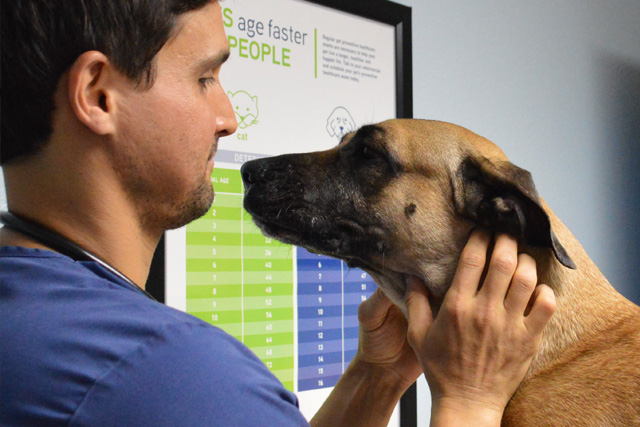Preventive Care
The American Veterinary Medical Association recommends preventative exam once a year through the age of 7 and twice yearly after 7 years of age. We offer preventative care services with convenient daytime and evening hours.
Regular preventative care including a nose-to-tail physical exam and early screening tests can uncover signs of a health problem before it reaches an advanced stage.
We recommend:
- Adult and senior preventative screens
- Oral health screening
- Intestinal parasite screens
- Heartworm & FELV/FIV testing
- Urinalysis testing

Physical Exam
Preventative care visits consist of complete physical exams from nose to tail. This includes looking over the ears, eyes, nose, mouth, skin, and listening to the heart & lungs. This important checkup allows us to evaluate the overall health and condition of your pet while also giving us a baseline for their unique bodies, allowing us to (remove “and”) catch any potential health problems before they progress.
Some of things evaluated include:
- Mouth and teeth
- New or unusual lumps or bumps
- Any significant weight loss or gain
- Internal or external parasites
- Discharge from eyes or ears
- Coat & Skin
Microchipping
Millions of pets become separated from their owners every year, unfortunately, many pets without identification never make it back home. Microchipping your pet is a simple, safe, and effective way to ensure that your pet can be returned home safely. The process involves safely implanting a tiny microchip, about the size and shape as a grain of rice, under your pet’s skin between the shoulder blades in a procedure similar to a vaccination. Ask us about having your pet microchipped today.
Vaccines
Just like in people, vaccinations are an integral part of your pet’s overall health. Vaccines help stimulate your pet’s immune system to fight off disease causing organisms and improve your pet’s overall quality of life. Our veterinary care team can help you to understand your pet’s risk factors including life stage, medical history, environment, and lifestyle to determine an appropriate vaccine plan for your pet.
